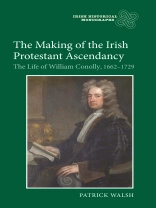The life and political career of William Conolly, a key figure in the establishment of the eighteenth century protestant ascendancy in Ireland.
William Conolly (1662-1729) was one of the most powerful Irish political figures of his day. As a politician, in the years 1715-29 simultaneously Speaker of the Irish House of Commons, Chief Commissioner of the Revenue, Lord Justice, and Privy Councillor, he made significant contributions to the role of the Irish parliament in Irish life, to the establishment of a more efficient government bureaucracy, and to the emergence of a constructive strain of patriotism. In addition, he was a patron of architects, contributing significantly to the fashioning of Georgian Dublin, and building his own Palladian mansion at Castletown, nowadays one of the most frequently visited Irish historic properties. His rise to wealth and eminence from very humble beginnings and a Catholic background also illustrates the permeability of Irish society. Conolly’s career reflects the development of the early Georgian Irish political, cultural and ideological nation, in all its complexities and contradictions.
PATRICK WALSH is an IRCHSS Government of Ireland CARA mobility fellow jointly affiliated with University College London and University College Dublin. .
Содержание
Introduction
The rise of the house of Conolly, 1662-1729
From lawyer to politician, 1685-1703
‘A cunning intriguing spark’: Conolly and the Williamite confiscation, 1690-1703
The making of a ‘very great fortune’: the accumulation and management of the Conolly patrimony, 1690-1729
A lover of business: Conolly in Parliament, 1703-14
The ‘great man of the north’: Conolly’s electoral interest in north-west Ulster
‘The only man of application among our commissioners’: Conolly at the revenue board, 1709-1729
‘The chief of our friends’: Parliamentary management and the rise of the undertakers, 1715-1729
‘An ornament to the country’: Castletown, patriotism and the making of the ascendancy, 1722-1729












